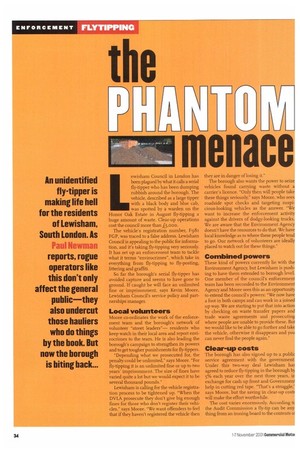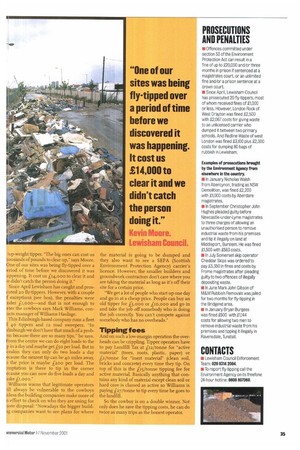enace
Page 34

Page 35

If you've noticed an error in this article please click here to report it so we can fix it.
Lewisham Council in London has been plagued by what it calls a serial fly-tipper who has been dumping rubbish around the borough. The vehicle, described as a large tipper with a black body and blue cab, was spotted by a warden on the Honor Oak Estate in August fly-tipping a huge amount of waste. Clear-up operations cost the council more than 15,000.
The vehicle's registration number, F981 FGP, was traced to a false address. Lewisham Council is appealing to the public for information, and it's taking fly-tipping very seriously. It has set up an enforcement team to tackle what it terms "envirocrimes'', which take in everything from fly-tipping to fly-posting, littering and graffiti.
So far the borough's serial fly-tipper has avoided capture and seems to have gone to ground. If caught he will face an unlimited fine or imprisonment, says Kevin Moore, Lewisham Council's service policy and partnerships manager.
Local volunteers Moore co-ordinates the work of the enforcement team and the borough's network of volunteer "street leaders"— residents who keep watch in their local area and report envirocrimes to the team. He is also leading the borough's campaign to strengthen its powers and to get tougher punishments for fly-tippers.
"Depending what we prosecuted for, the penalty could be unlimited," says Moore. "For fly-tipping it is an unlimited fine or up to two years' imprisonment. The size of fines have varied quite a lot but we would expect it to be several thousand pounds."
Lewisham is calling for the vehicle registration process to be tightened up. "When the DVLA prosecute they don't give big enough fines for those who don't register their vehicles," says Moore. "We want offenders to feel that if they haven't registered the vehicle then
they are in danger of losing it."
The borough also wants the power to seiz( vehicles found carrying waste without carrier's licence. "Only then will people take these things seriously." says Moore, who see: roadside spot checks and targeting suspi cious-looking vehicles as the answer. "W( want to increase the enforcement activitl against the drivers of dodgy-looking trucks We are aware that the Environment Agencl doesn't have the resources to do that. We have local knowledge as to where these people tenc to go. Our network of volunteers are idealll placed to watch out for these things." A
Combined powers
These kind of powers currently lie with the Environment Agency, but Lewisham is push ing to have them extended to borough level One member of the council's enforcemen team has been seconded to the Enyironmen Agency and Moore sees this as an opportunip to extend the council's powers: "We now have a foot in both camps and can work in a joine< up way. We are starting to put that into actior by checking on waste transfer papers anc trade waste agreements and prosecutinE where people are unable to provide these. Bu we would like to be able to go further and take the vehicle, otherwise it disappears and yot can never find the people again."
Clear-up costs
The borough has also signed up to a public service agreement with the government Under this two-way deal Lewisham hai agreed to reduce fly-tipping in the borough 131 5% each year over the next three years, ir exchange for cash up front and Governmen help in cutting red tape. "That's a struggle,' says Moore, but the saving in clear-up cost will make the effort worthwhile.
The cost varies enormously. According te the Audit Commission a fly-tip can be any thing from an ironing board to the contents o lop-weight tipper. "The big ones can cost us .aousands of pounds to clear up," says Moore. One of our sites was being fly-tipped over a ■ eriod of time before we discovered it was .appening. It cost us £14,000 to dear it and ie didn't catch the person doing it."
Since April Lewisham has caught and proscuted zo fly-tippers. However, with a couple f exceptions (see box), the penalties were nder LI,000—and that is not enough to eter the cowboys says Mark Williams, con:acts manager of Williams Haulage.
This Edinburgh-based company runs a fleet f 40 tippers and 12 road sweepers. "In clinburgh we don't have that much of a probim because there are so many tips," he says. From the centre we can do eight loads to the p in a day and maybe get L5o per load. But in cndon they can only do two loads a day ecause the nearest tip can be 40 miles away, o the price is maybe Lzoo per load. The nnptation is there to tip in the corner ecause you can now do five loads a day and lake Li,000."
Williams warns that legitimate operators ill always be vulnerable to the cowboys rdess the building companies make more of n effort to check on who they are using for ,aste disposal: "Nowadays the bigger buildig companies want to see plans for where the material is going to be dumped and they also want to see a SEPA (Scottish Environment Protection Agency) carrier's licence. However, the smaller builders and groundwork contractors don't care where you are taking the material as long as it's off their site for a certain price.
"We get a lot of people who start up one day and go in at a cheap price. People can buy an old tipper for L5,000 or Lio,000 and go in and take the job off somebody who is doing the job correctly. You can't compete against somebody who has no overheads."
Tipping fees
And on such a low-margin operation the overheads can be crippling. Tipper operators have to pay Landfill Tax at Liz/tonne for "active material" (trees, roots, plastic, paper) or L2 /tonne for "inert material" (clean soil, bricks and concrete) every time they tip. On top of this is the L55/tonne tipping fee for active material. Basically anything that contains any kind of material except clean soil or hard core is classed as active so Williams is paying L27/tonne to tip every time he goes to the landfill.
So the cowboy is on a double winner. Not only does he save the tipping costs, he can do twice as many trips as the honest operator.
















































































































































